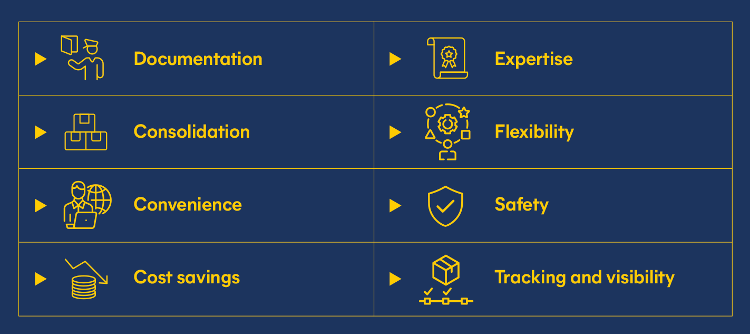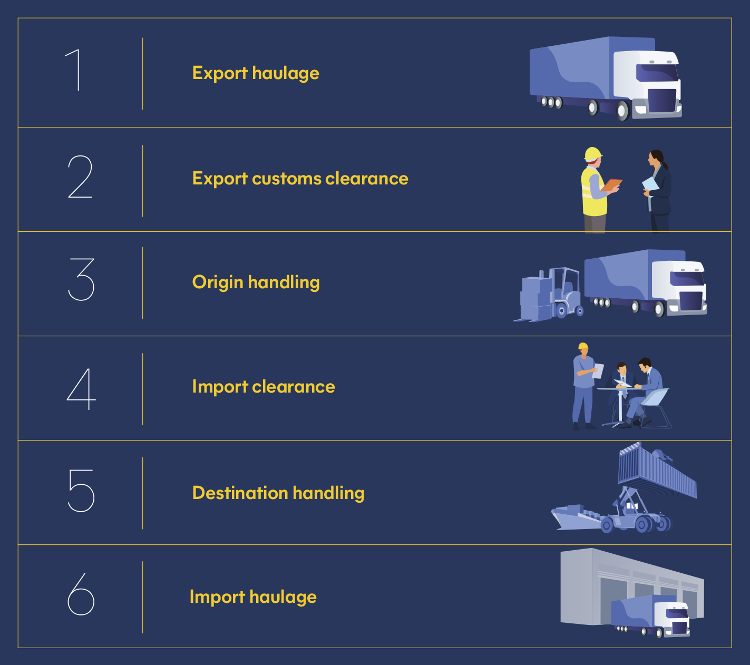Share this post
Freight forwarding: Do you know what it is?
Table of contents
- What is global freight forwarding?
- What is the difference between a carrier and a freight forwarder?
- Freight forwarding: other players in the supply chain
- Benefits of hiring a freight forwarding service
- Six stages of freight forwarding
- Difference between a freight forwarder and a custom agent
- The importance of supply chain management (SCM)
- Why choose a global freight forwarder specializing in your product?
In freight forwarding, many different types of companies play a role in getting products, like wine from one country to another.
Freight forwarders, like Hillebrand Gori offer a wide range of services and solutions to manage the entire logistics process. Whilst carriers usually, only physically move cargo from one place to another.
Knowing the roles of freight forwarders and carriers is just one essential piece of information for the timely and safe delivery of your beverages. Choosing a freight forwarder specializing in transporting a particular product is also a beneficial part of that process.
What is the difference between a carrier and a freight forwarder?
A carrier is a company that provides the physical transportation of products.
Carriers can be air-based (aircraft), land-based (trucks, trains) or water-based (ships, barges). There are two classifications of a carrier.
- VOCCs (Vessel Operating Common Carriers) typically own the assets for moving cargo like ships, trucks or planes.
- NVOCCs (Non-Vessel Operating Common Carriers) refer to freight forwarders that have partnerships with VOCCs. Typically they do not own assets.
Some carriers also offer limited value-added services, like loading/unloading products.
A freight forwarder is a company that specializes in managing the whole supply chain process. They forward freight into the care of carriers and to its destination.
They can also advise the best way to move shipments, considering conditions that might affect the journey to determine the:
- Best route
- Right temperature control
- Most suitable container
- Other handling requirements
Freight forwarders often work with multiple carriers to find the best service for shipping products based on cost, transit time and route. The role of freight forwarders is broad and all encompassing managing every aspect of moving a shipment between locations in a complete end-to-end service.
Additionally, freight forwarders can provide other services like:
Freight forwarding: other players in the supply chain
There are other players in the supply chain that work with freight forwarders and carriers.
Shippers
The shipper is the company/person initially responsible for exporting the products and arranging transport, according to the IncotermsⓇ.
That responsibility may change as a transport journey progresses. For example, the seller may be responsible for the shipment for the initial part of the journey, then responsibility shifts to the buyer in accordance to the term of sale agreed (IncotermⓇ).
The shipper is the person/company exporting the products named in the shipping documents (including the Bill of Lading (BOL or B/L), commercial invoice and packing list as the party responsible for sending the shipment.
On a Master Bill of Lading, the named shipper may be a freight forwarder.
Consignee
The consignee — typically the buyer — is the recipient of the goods and legally responsible for ownership upon delivery. It’s usually the buyer — the person or company who will own the products once delivered, but not always. For example, it could be the buyer’s agent or bank.
The term buyer would be used in the sale contract, but consignee will always be the term used in the contract of carriage. If shipments destined for a third-party logistics (3PL) company, the 3PL wouldn’t be the consignee. It’s always the ultimate consignee — the buyer. In international shipments, the consignee is the importer of record.
Consignor
The consignor is the party, person or company that will send the shipment.
Typically, the consignor and seller are the same entity. It’s important to remember that freight ownership doesn’t legally change until the recipient of the (the consignee) signs the Bill of Lading.
The consignor retains legal ownership of the products until the ultimate sale. When shipping internationally, the consignor is the exporter of record.
Notify party
A notify party is any person or company to which a carrier or shipper provides shipment information upon the arrival of cargo. Usually, the named notify party is a freight forwarder, agent or customs broker that will deal with customs clearance and cargo delivery.
There are many different players involved in the global freight forwarding process. And each one plays an important role in ensuring that shipments arrive at their destination safely and on time.
Benefits of hiring a freight forwarding service
Freight forwarders have the knowledge and experience to manage every aspect of the logistics process, making a complex process much easier for you. When working with a freight forwarder, you’ll have access to the most efficient routes and modes of transportation available.
There are many benefits of working with a freight forwarder, including:

Documentation: Freight forwarders handle paperwork, saving time and reducing the risk of errors.
Consolidation: Freight forwarders can combine multiple shipments into one container or truckload, lowering costs and increasing efficiency.
Convenience: When working with a freight forwarder, you have one point of contact for all your shipping needs. This saves you a lot of time and hassle compared to working with multiple carriers.
Cost savings: Freight forwarders maintain relationships with multiple carriers. Because of the volume of cargo they manage, they get discounts on shipping rates, then pass on those savings to clients.
Expertise: Freight forwarders understand the industry, including regulations, documentation and customs procedures. This expertise helps you streamline logistics operations and avoid costly mistakes.
Flexibility: Freight forwarders provide custom solutions to meet your business’ needs. This can include tailored transportation modes, warehousing and inventory management.
Safety: Shipping products worldwide involves an element of risk. Freight forwarders specializing in particular types of cargo have the expertise to advise you about the safest routes and most effective ways to better protect your shipment.
Tracking and visibility: Freight forwarders have advanced technology that provide real-time tracking and visibility. This helps streamline logistics operations and provide better customer service. We have an app called myHillebrandGori.
The global freight forwarding industry is complex, but working with a freight forwarder doesn't have to be. By partnering with the right company, businesses can reap the many benefits they offer, from cost savings and convenience to expertise and in-depth knowledge of regulations.
Six stages of freight forwarding
Freight forwarding is a complex process that involves the coordination of many different activities.
The main goal is to ensure products, like wine, arrive on time and undamaged. The six stages of freight forwarding are:

Export haulage: Transporting the shipment from the shipper's premises to the port or terminal of departure.
Export customs clearance: Clearing the shipment for export with the relevant authorities.
Origin handling: Loading the shipment onto the vessel, train, truck or aircraft at the port or terminal of departure.
Import clearance: Clearing the shipment at the port or terminal of arrival with the relevant authorities.
Destination handling: Unloading shipment from the vessel or aircraft at the port or terminal of arrival.
Import haulage: Transporting of shipment from the port or terminal of arrival to the consignee's premises.
There are many different steps involved in the freight forwarding process and each step must be carefully coordinated to ensure a smooth and efficient shipping process. If any part of the logistics supply chain is compromised, it can have a serious impact on the timely delivery of shipment.
That's why it's important to choose a freight forwarder with the experience and expertise to handle shipments from start to finish.
Difference between a freight forwarder and a custom agent
When transporting goods, freight forwarders and customs agents play an important role.
A customs agent prepares and submits customs documents for import and export. They also provide guidance on tariffs and regulations.
A customs agent specializes in the country where they are based. But freight forwarders specalize in international trade since they may have offices and/or agents worldwide.
A freight forwarder offers a more comprehensive service since they provide customs clearance as well as export and import services. While a customs agent only does customs work, a freight forwarder can outsource customs declarations and submissions to agents as part of their overall service to manage the entire supply chain for the customer who will only have to deal with one point of contact.
The importance of supply chain management (SCM)
Supply chain management (SCM) is the process of planning and managing supply chains from production to end-user consumption.
The role of SCM is to adjust and orchestrate the supply chain to work efficiently so the company achieves its goals. It connects supply chain stakeholders so all parties have full visibility of shipments through dashboards, notifications, real-time data and task alerts.
An efficient and effective SCM process helps:
- Enhance efficiency: Wine demand isn't linear. There are peaks of consumption at certain times of the year like, Christmas, Thanksgiving or Valentine's Day. Efficient supply chain management will help you adjust the stock to cover demand during peak seasons and reduce inventory when demand decreases.
- Improve wine availability: Forecasting and production planning help ensure wine is available when and where needed so that businesses can improve customer satisfaction.
- Optimize costs: Origin consolidation services can keep the flow of wine frequent and in volumes easier to store and sell.
- Reduce lead times: By reducing the time it takes to get wine from supplier to customer, businesses can respond more quickly to customer demand.
- Streamline the flow of wine: By managing the physical movement of wine and information, businesses can improve sales and the overall efficiency of their operations.
- Cope with rapid changes in the market: By adapting their supply chain to changes in customer demand or the availability of raw materials, businesses can better respond to market fluctuations.
A well-managed supply chain provides a competitive advantage for businesses.
Why choose a global freight forwarder specializing in your product?
Specialized freight forwarders, like Hillebrand Gori, understand how to handle your product. We understand the unique challenges of shipping alcohol and know how to minimize risks. We’re also up to date on the latest regulations which is critical, because failing to follow regulations can result in delays, fines and other problems.
Finally, working with a specialized freight forwarder gives you access to their network of carriers, suppliers and other service providers. This can save you time and money because we already have established relationships with these companies.
Any carrier or forwarder can move cargo or book it to be moved, but it's about focusing on the care of the wine, beer and spirits, not just the physical movement. This is what sets Hillebrand Gori apart.
We transport wine, beer and other products that are sensitive to temperature and humidity changes and must be handled carefully. We understand that our clients' products are their livelihoods, so we take time to get to know their products and understand their shipping needs.
We invest heavily in research and development to offer solutions like our insulation liner with breathable membrane. When it comes to global freight forwarding, you can’t afford to take risks. You need a trustworthy partner to get your products where they need to go, on time and in perfect condition.
If you're looking for a freight forwarder specializing in moving beverages and other products with special care in transit, look no further than Hillebrand Gori. Request a quote today and let us help you find the right solution for your shipping needs.
Published 09th August 2023, updated 17th November 2023
Logistics involves the management of supply chains. Freight forwarding is a subset of logistics that focuses on arranging the transport of products from one place to another.
The cost varies depending on the quantity of products shipped, the distance between origin and destination, transport mode, and any additional service requirements. A freight forwarder can provide a quote outlining all costs associated with the shipment.
Many use global tracking systems that combine various data sources to monitor the progress of shipments in real time. These sources include container tracking, GPS, manifest data and satellite tracking. Some freight forwarders, like Hillebrand Gori, provide access to an online portal to track shipments.
When selecting a freight forwarder, consider their experience and expertise in your industry, network and infrastructure capabilities, and customer service standards. It's also important to understand their pricing and any additional services they offer.
How can we help your business grow?
-ebook-1---global-freight-forwarding/hil---cta-text-1---ebook-global-freight-forwarding-(1).png?sfvrsn=a2292c3e_3)
-ebook-1---global-freight-forwarding/hil---cta-post---yellow.jpg?sfvrsn=5e55bfc5_2)



